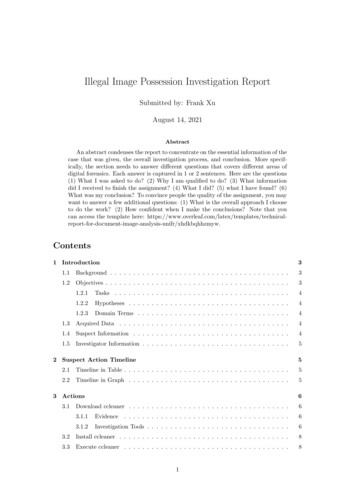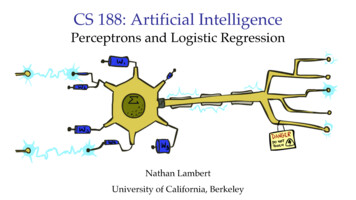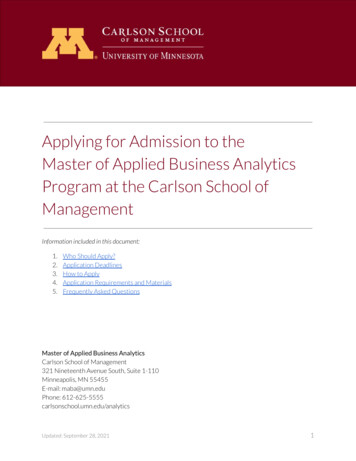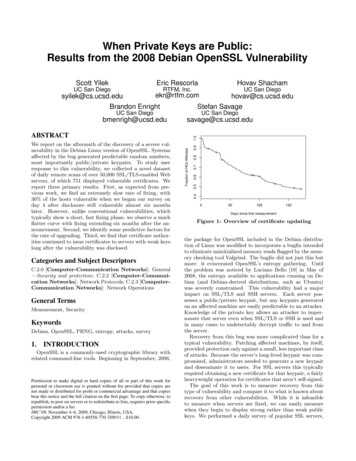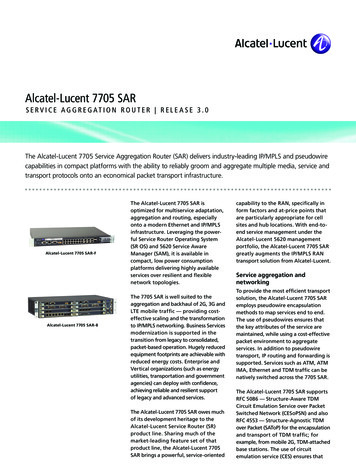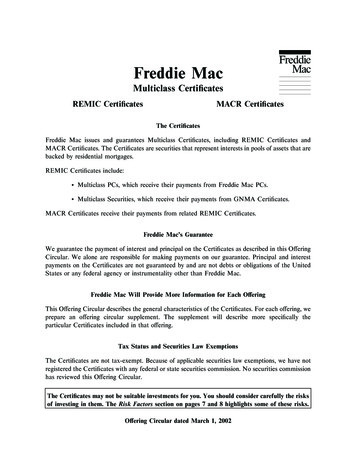
Transcription
Freddie MacMulticlass CertiÑcatesREMIC CertiÑcatesVMACR CertiÑcatesThe CertiÑcatesFreddie Mac issues and guarantees Multiclass CertiÑcates, including REMIC CertiÑcates andMACR CertiÑcates. The CertiÑcates are securities that represent interests in pools of assets that arebacked by residential mortgages.REMIC CertiÑcates include:‚ Multiclass PCs, which receive their payments from Freddie Mac PCs.‚ Multiclass Securities, which receive their payments from GNMA CertiÑcates.MACR CertiÑcates receive their payments from related REMIC CertiÑcates.Freddie Mac's GuaranteeWe guarantee the payment of interest and principal on the CertiÑcates as described in this OÅeringCircular. We alone are responsible for making payments on our guarantee. Principal and interestpayments on the CertiÑcates are not guaranteed by and are not debts or obligations of the UnitedStates or any federal agency or instrumentality other than Freddie Mac.Freddie Mac Will Provide More Information for Each OÅeringThis OÅering Circular describes the general characteristics of the CertiÑcates. For each oÅering, weprepare an oÅering circular supplement. The supplement will describe more speciÑcally theparticular CertiÑcates included in that oÅering.Tax Status and Securities Law ExemptionsThe CertiÑcates are not tax-exempt. Because of applicable securities law exemptions, we have notregistered the CertiÑcates with any federal or state securities commission. No securities commissionhas reviewed this OÅering Circular.The CertiÑcates may not be suitable investments for you. You should consider carefully the risksof investing in them. The Risk Factors section on pages 7 and 8 highlights some of these risks.OÅering Circular dated March 1, 2002
If you intend to purchase CertiÑcates, you should rely only on the information in this OÅeringCircular and in the related oÅering circular supplement (""Supplement''), including the informationin any disclosure documents that we incorporate by reference. We have not authorized anyone toprovide you with diÅerent information.This OÅering Circular, the related Supplement and any incorporated documents may not becorrect after their dates.We are not oÅering the CertiÑcates in any jurisdiction that prohibits their oÅer.TABLE OF CONTENTSDescriptionFreddie Mac tional Information �ÏÏÏÏÏÏÏÏÏÏÏÏÏÏÏÏÏÏRisk Factors ription of CertiÑcates ÏÏÏÏÏÏÏÏÏÏÏÏREMIC Pool Structures ÏÏÏÏÏÏÏÏÏREMIC Pool Assets ÏÏÏÏÏÏÏÏÏÏÏÏPayments ÏÏÏÏÏÏÏÏÏÏÏÏÏÏÏÏÏÏÏÏÏÏForm, Holders and �ÏÏMACR CertiÑcates ÏÏÏÏÏÏÏÏÏÏÏÏÏÏÏÏÏPrepayment, Yield and �ÏÏÏÏÏÏÏPrepayments ility ÏÏÏÏÏÏÏÏÏÏÏÏÏÏÏÏÏÏÏÏÏTabular Information inSupplements ÏÏÏÏÏÏÏÏÏÏÏÏÏÏÏÏÏThe �Transfer of Assets to REMICPool rious Matters Regarding FreddieMac ents of Default ÏÏÏÏÏÏÏÏÏÏÏÏÏÏÏRights Upon Event of Default ÏÏÏÏVoting Under Any �ÏÏÏAmendment ÏÏÏÏÏÏÏÏÏÏÏÏÏÏÏÏÏÏÏGoverning Law ÏÏÏÏÏÏÏÏÏÏÏÏÏÏÏÏÏCertain Federal Income TaxConsequences ption3347991013General C Election ÏÏÏÏÏÏÏÏÏÏÏÏÏÏÏStatus of REMIC CertiÑcates ÏÏÏÏTaxation of Regular Classes ÏÏÏÏÏÏTaxation of Residual Classes ÏÏÏÏÏSale or Exchange of REMICCertiÑcates ÏÏÏÏÏÏÏÏÏÏÏÏÏÏÏÏÏÏTransfers of Interests in a ResidualClass tment of ServicingCompensation ÏÏÏÏÏÏÏÏÏÏÏÏÏÏÏÏTaxation of MACR Classes ÏÏÏÏÏÏExchanges of MACR Classes andRegular Classes ÏÏÏÏÏÏÏÏÏÏÏÏÏÏTaxation of Certain ForeignInvestors ÏÏÏÏÏÏÏÏÏÏÏÏÏÏÏÏÏÏÏÏBackup Withholding ÏÏÏÏÏÏÏÏÏÏÏÏReporting and AdministrativeMatters ÏÏÏÏÏÏÏÏÏÏÏÏÏÏÏÏÏÏÏÏÏERISA Considerations ÏÏÏÏÏÏÏÏÏÏÏÏÏÏLegal Investment Considerations ÏÏÏÏÏÏPlan of Distribution ÏÏÏÏÏÏÏÏÏÏÏÏÏÏÏÏÏIncrease in Size ÏÏÏÏÏÏÏÏÏÏÏÏÏÏÏÏÏÏÏÏAppendix I Ì Index of Terms ÏÏÏÏÏÏÏÏAppendix II Ì Standard DeÑnitionsand Abbreviations for ClassesÏÏÏÏÏÏÏAppendix III Ì MACR CertiÑcateExchanges ndix IV Ì Retail Class PrincipalPayments pendix V Ì Interest Rate Indices dix I shows the page numbers where deÑnitions of capitalized terms appear. Appendix IIcontains our standard deÑnitions and abbreviations for various types of CertiÑcates.2
FREDDIE MACFreddie Mac was chartered in 1970 under the Federal Home Loan Mortgage Corporation Act(the ""Freddie Mac Act''). Freddie Mac's statutory purposes are:‚ To provide stability in the secondary market for residential mortgages.‚ To respond appropriately to the private capital markets.‚ To provide ongoing assistance to the secondary market for residential mortgages, includingmortgages on housing for low- and moderate-income families.‚ To promote access to mortgage credit throughout the United States (including central cities,rural areas and underserved areas) by increasing the liquidity of mortgage investments andimproving the distribution of investment capital available for residential mortgage Ñnancing.We fulÑll these statutory purposes by purchasing residential mortgages and mortgage-relatedsecurities from mortgage lenders, other mortgage sellers and securities dealers. We Ñnance ourpurchases by issuing guaranteed mortgage securities, debt securities, other liabilities and equitycapital.ADDITIONAL INFORMATIONWe prepare an annual Information Statement that describes our business and operations andcontains our audited Ñnancial statements. We prepare quarterly Information Statement Supplements that include unaudited Ñnancial data and other information concerning our business andoperations.We also prepare oÅering circulars for our Mortgage Participation CertiÑcates (the ""PCOÅering Circular'') and our Giant, Stripped Giant and Callable Pass-Through CertiÑcates (the""Giant OÅering Circular'').You can obtain any of these documents, as well as the disclosure documents and currentinformation for any securities we issue, from:Freddie Mac - Investor Inquiry8200 Jones Branch DriveMcLean, Virginia 22102-3110Telephone: 1-800-336-FMPC(703-903-4000 within Washington, D.C. area)E-mail: Investor Inquiry@freddiemac.comInternet Web-Site: http://www.freddiemac.com3
SUMMARYThis summary highlights selected information about the CertiÑcates. Before buying CertiÑcates, you should read the remainder of this OÅering Circular and the Supplement for theparticular oÅering. You should rely on the information in the Supplement if it is diÅerent from theinformation in this OÅering Circular.Issuer and Guarantor ÏÏÏÏÏÏÏ Federal Home Loan Mortgage Corporation, or ""Freddie Mac,'' ashareholder-owned government-sponsored enterprise.REMIC CertiÑcates ÏÏÏÏÏÏÏÏ ""REMIC CertiÑcates'' represent beneÑcial ownership interests in""REMIC Pools,'' which are pools of assets that we form. Weissue REMIC CertiÑcates in series (""Series''), each consistingof two or more ""REMIC Classes.''""Multiclass PCs'' are REMIC CertiÑcates backed directly orindirectly by Freddie Mac PCs. ""Multiclass Securities'' areREMIC CertiÑcates backed directly or indirectly by GNMACertiÑcates.MACR CertiÑcates ÏÏÏÏÏÏÏÏÏ Some Series include Classes (""MACR Classes'') of ModiÑableand Combinable REMIC CertiÑcates (""MACR CertiÑcates'').In a Series with MACR Classes, the Holders of speciÑedREMIC Classes can exchange all or part of those Classes forproportionate interests in related MACR Classes and vice versa.The MACR Classes receive payments from their relatedREMIC Classes.Appendix III describes MACR CertiÑcates and exchange procedures and fees.""CertiÑcates'' and""Classes'' ÏÏÏÏÏÏÏÏÏÏÏÏÏÏÏ In this OÅering Circular and related Supplements, we use theterm ""CertiÑcates'' to include REMIC CertiÑcates and MACRCertiÑcates, and the term ""Classes'' to include REMIC Classesand MACR Classes.Assets and Mortgages ÏÏÏÏÏÏÏ The assets in each REMIC Pool (the ""Assets'') include FreddieMac PCs, GNMA CertiÑcates or other securities we havecreated or acquired. The Assets are backed by residentialmortgages that we have purchased (the ""Mortgages''). TheMortgages may be secured by single-family or multifamilyresidential properties, and may have either Ñxed or adjustableinterest rates.4
Payments ÏÏÏÏÏÏÏÏÏÏÏÏÏÏÏÏÏ We pay principal and interest due on a Class monthly on theapplicable Payment Date. Payment Dates fall on or about:‚ The 15th of each month, for Classes backed by PCs.‚ The 17th or 20th of each month, as applicable, for Classesbacked by GNMA CertiÑcates.‚ Interest ÏÏÏÏÏÏÏÏÏÏÏÏÏÏÏ We pay interest on each Class at its applicable per annum interestrate (""Class Coupon''). Interest payable on a Payment Dateaccrues during the monthly periods speciÑed in the relatedSupplement. However, interest on Accrual Classes and PartialAccrual Classes is paid only to the extent described in therelated Supplements. Principal Only Classes have a Class Coupon of 0% and do not receive interest.‚ Principal ÏÏÏÏÏÏÏÏÏÏÏÏÏÏ We pay principal on the CertiÑcates of each Series on eachPayment Date as described in the related Supplement. TheHolders of any Class that receives principal payments receivethose payments on a pro rata basis, subject to any specialallocation procedures that may apply to Retail Classes.Notional Classes receive interest payments but not principalpayments. They have notional principal amounts on which wecalculate their interest.Retail Classes ÏÏÏÏÏÏÏÏÏÏÏÏÏ Some Series include Retail Classes, which are designed primarilyfor individual investors. We typically issue and pay RetailClasses in 1,000 increments, or ""Retail Class Units.'' Appendix IV describes principal payments on most Retail Classes.REMIC Election and TaxStatus of the CertiÑcates ÏÏ We will elect to treat each REMIC Pool as a real estate mortgageinvestment conduit (""REMIC'') under the Internal RevenueCode of 1986 (the ""Code''). ""Regular Classes'' constitute""regular interests'' in their related REMIC Pools and each""Residual Class'' constitutes the ""residual interest'' in its related REMIC Pool.In general, Regular Classes are taxed as debt instruments, butResidual Classes are not. Special tax rules apply to ResidualClasses. These rules often impose tax liabilities on ResidualClasses that exceed any payments they receive. You should notpurchase a Residual Class before consulting your tax advisor.The arrangements under which MACR Classes are created(""MACR Pools'') will be classiÑed as grantor trusts for federalincome tax purposes.5
Form of CertiÑcates ÏÏÏÏÏÏÏÏ Each Supplement will specify the form of the CertiÑcates oÅeredby that Supplement.‚ Non-Retail Regular and MACR Classes in most cases areissued, held and transferable on the book-entry system of theFederal Reserve Banks (the ""Fed System'').‚ Retail Classes and some other Regular and MACR Classes areissued, held and transferable on the book-entry system (the""DTC System'') of The Depository Trust Company or itssuccessor (""DTC'').‚ We issue some Classes, including all Residual Classes, inregistered certiÑcated form. They are transferable at our oÇce,in our capacity as registrar, or at the oÇce of any successorregistrar we designate (the ""Registrar''). You may contactFreddie Mac as Registrar through our Investor Inquiry Department or at:OÇce of Registrar Ì MS 300Freddie Mac8200 Jones Branch DriveMcLean, VA 22102-3110Holders ÏÏÏÏÏÏÏÏÏÏÏÏÏÏÏÏÏÏÏ As an investor in CertiÑcates, you are not necessarily the Holderof those CertiÑcates. You ordinarily must hold your CertiÑcatesthrough one or more Ñnancial intermediaries. You may exerciseyour rights as an investor only through the Holder of yourCertiÑcates, and we may treat the Holder as the absolute ownerof your CertiÑcates. The term ""Holder'' means:‚ For a Class held on the Fed System, any entity that appears onthe records of a Federal Reserve Bank as a holder of that Class.‚ For a Class held on the DTC System, DTC or its nominee.‚ For a certiÑcated Class, any entity or individual that appears onthe records of the Registrar as a registered holder of that Class.6
RISK FACTORSAlthough we guarantee the payments on the CertiÑcates, and so bear the associated credit risk,as an investor you will bear the other risks of owning mortgage securities. This section highlightssome of these risks. Prepayment, Yield and Suitability Considerations discusses them in more detail.The CertiÑcates May Not be Suitable Investments for You. The CertiÑcates are complexsecurities. You need to understand the risks of your investment, and you need to be able to analyzethe information in the related oÅering documents as well as the economic and other factors that mayaÅect your investment. If you require a deÑnite payment stream, or a single payment on a speciÑcdate, the CertiÑcates are not suitable investments for you. If you purchase CertiÑcates, you need tohave enough Ñnancial resources to bear all of the risks related to your CertiÑcates.Principal Payment Rates are Uncertain. Principal payment rates on the CertiÑcates willdepend on the rates of principal payments on the underlying Mortgages. Mortgage principalpayments include scheduled payments and prepayments. Prepayment rates Öuctuate continuouslyand (in some market conditions) substantially. In general, prepayments tend to increase whencurrent interest rates decline, as more borrowers choose to reÑnance their existing mortgages. Ascurrent interest rates increase, reÑnancings and prepayments generally decline.Prepayments Can Reduce Your Yield. Your yield on a Class of CertiÑcates will depend on itsprice, the rate of prepayments on its underlying Mortgages and the actual characteristics of thoseMortgages. The Mortgages may be prepaid at any time, in most cases without penalty. The yield onyour Class could be lower than you expect if:‚ You buy your Class at a discount to its principal amount and principal payments are slowerthan you expect.‚ You buy your Class at a premium over its principal amount and principal payments are fasterthan you expect.If you buy an Interest Only Class or any other Class at a signiÑcant premium and prepayments arefast, you may not even recover your investment.Callable Classes are Subject to Redemption Risks. If you own a Callable Class, a redemptionof the underlying Assets will be similar in its principal payment eÅect to a full prepayment of all therelated Mortgages. After a Callable Class becomes redeemable, its value is not likely to exceed, andmay be lower than, its redemption price.Reinvestment of Principal Payments May Produce Lower Yields. Mortgages tend to prepayfastest when current interest rates are low. When you receive principal payments in a low interestrate environment, you may not be able to reinvest them in comparable securities with as high a yieldas your CertiÑcates.Index Levels Can Reduce Your Yield if You Own a Floating Rate or Inverse Floating RateClass. The yield on your Class could be lower than you expect if:‚ You own a Floating Rate Class and the levels of the applicable Index are lower than youexpect.‚ You own an Inverse Floating Rate Class and the levels of the applicable Index arehigher than you expect.7
If you buy an Interest Only Floating Rate Class, you may not even recover your investment if thelevel of the applicable Index is low or prepayments are fast. If you buy an Interest Only InverseFloating Rate Class, you may not even recover your investment if the level of the applicable Index ishigh or prepayments are fast.Classes That Support Other Classes are More Sensitive to Prepayment Rates. If you own aClass, such as a Support Class, that supports the principal payment stability of other Classes, yourClass is likely to be more sensitive to prepayment rates than are any Classes it supports. You maynot receive principal payments on your Class for extended periods of time, and you may receiveprincipal payments that change signiÑcantly from period to period. The same may be true if theAssets underlying your CertiÑcates include a previously issued Class that supports other Classes inits own Series.Classes May Not Adhere to Their Principal Payment Schedules. If you own a Class, such asa PAC, TAC or Scheduled Class, that was structured to receive principal payments in accordancewith a schedule, we cannot assure you that your Class will adhere to that schedule. Your Class willbecome more sensitive to Mortgage prepayments after its own supporting Classes are retired.Moreover, your Class may support other Classes. The same may be true if the Assets underlyingyour CertiÑcates include a previously issued Class that was structured to receive principal paymentsin accordance with a schedule in its own Series.The CertiÑcates are Subject to Market Risks. The market value of your CertiÑcates will varyover time, primarily in response to changes in prevailing interest rates. If you sell your CertiÑcateswhen their market value is low, you may experience signiÑcant losses. A secondary market for someCertiÑcates may not develop. Even if a market does develop, it may not be liquid enough to allowyou to sell your CertiÑcates easily or at your desired price. Moreover, you may not be able to sellvery small or very large amounts of CertiÑcates at prices available to other investors.Your Ability to Exchange REMIC CertiÑcates and MACR CertiÑcates May be Limited. You must own the right Classes in the right proportions to enter into an exchange involvingMACR CertiÑcates. If you do not own the right Classes, you may not be able to obtain thembecause:‚ The owner of a Class that you need for an exchange may refuse or be unable to sell thatClass to you at a reasonable price or at any price.‚ Some Classes may be unavailable because they have been placed into other Ñnancialstructures, including other REMIC Pools.‚ Principal payments and prepayments over time will decrease the amounts available forexchange.You May Not be Allowed to Buy Some CertiÑcates. If you are subject to legal investmentlaws and regulations or to review by regulatory authorities, you may not be allowed to invest in sometypes of CertiÑcates or in CertiÑcates generally. See Legal Investment Considerations.8
DESCRIPTION OF CERTIFICATESREMIC POOL STRUCTURESEach Series will be either a ""Single-Tier Series'' or a ""Double-Tier Series.''The REMIC CertiÑcates of a Single-Tier Series represent beneÑcial ownership interests in asingle REMIC Pool. The REMIC CertiÑcates of a Double-Tier Series represent beneÑcialownership interests in an ""Upper-Tier REMIC Pool'' and one or more ""Lower-Tier REMICPools.''In a Double-Tier Series:‚ The Classes issued from each Lower-Tier REMIC Pool (the ""Lower-Tier Classes'')represent beneÑcial ownership interests in that Pool.‚ One or more Lower-Tier Classes are included in the Upper-Tier REMIC Pool, wherethey will constitute the ""Mortgage Securities'' of that Pool.‚ The Classes issued from the Upper-Tier REMIC Pool (the ""Upper-Tier Classes'')represent beneÑcial ownership interests in that Pool.The REMIC CertiÑcates oÅered in a Double-Tier Series usually include all of the Upper-TierClasses plus the Residual Class of each Lower-Tier REMIC Pool.The following diagrams illustrate the structures for typical Single-Tier and Double-Tier Series.Any particular Series may have a diÅerent structure, as described in the related Supplement.Double-Tier Series frequently include more than one Lower-Tier REMIC Pool. Series withGuaranteed Maturity Classes include additional REMIC Pools, as described in the relatedSupplements.Single-TierDouble-TierHolders of REMIC CertiÑcatesoHolders of REMIC CertiÑcatesoRegular ClassesoResidual ClassRegular Classes ofUpper-Tier REMIC PooloResidual Class ofUpper-Tier REMIC PoolUpper-Tier REMIC PoolREMIC PoolooMortgage Securities(Regular Interests inLower-Tier REMIC Pool)Assets (e.g., PCs orGNMA CertiÑcates)oLower-Tier REMIC PooloMortgagesAssets (e.g., PCs orGNMA CertiÑcates)oMortgages9oResidual Class ofLower-Tier REMIC Pool
The Classes of CertiÑcates fall into diÅerent descriptive categories. Each Supplement willidentify the categories applicable to each Class by using standard abbreviations. These abbreviations and their deÑnitions appear in Appendix II.REMIC POOL ASSETSGeneralEach REMIC Pool includes any one or more of the following Assets:‚ PCs, including Freddie Mac Mortgage Participation CertiÑcates and Freddie MacGiant PCs.‚ GNMA-Related Securities, including GNMA CertiÑcates and Freddie Mac GiantSecurities.‚ Previously issued REMIC or MACR Classes.‚ Freddie Mac Stripped Giant CertiÑcates.‚ A Callable Class of a Series of Freddie Mac Callable Pass-Through CertiÑcates(""CPCs'').‚ Any other types of securities that are eligible for inclusion in a REMIC and that receivepayments from PCs or GNMA CertiÑcates.Each REMIC Pool may also include cash or other eligible assets. See The Agreement Ì Transferof Assets to REMIC Pool. In Series with Retail Classes, REMIC Pools usually include non-interestbearing cash deposits in amounts speciÑed in the related Supplement (""Retail Rounding Accounts'') to be applied as described in Appendix IV.In any Series, the underlying Assets may be divided into two or more groups (""AssetGroups''). The Supplement for each Series will contain more speciÑc information regarding theAssets for the Series.The remainder of this section describes the general characteristics of PCs and GNMA-RelatedCertiÑcates, which directly or indirectly back all CertiÑcates.PCs""PCs'' include Freddie Mac Mortgage Participation CertiÑcates and Freddie Mac Giant PCs.Our PC OÅering Circular and Giant OÅering Circular describe the characteristics of the varioustypes of PCs. Supplements for CertiÑcates backed by PCs will incorporate by reference the currentPC and Giant OÅering Circulars.Mortgage Participation CertiÑcatesMortgage Participation CertiÑcates are single-class securities, guaranteed by us, that representundivided interests in pools of Mortgages. Nearly all Mortgages that back Mortgage ParticipationCertiÑcates are conventional mortgages, which means that neither the United States nor any federalagency or instrumentality guarantees or insures them.10
If the underlying Mortgages have Ñxed rates of interest, the Mortgage Participation CertiÑcatesmay be either ""Gold PCs'' or ""Original PCs.'' If the underlying Mortgages have adjustable rates ofinterest (""ARMs''), the related Mortgage Participation CertiÑcates are called ""ARM PCs.''For Gold PCs, there is a delay of approximately 45 days between the time interest begins toaccrue and the time the investor receives the interest payment. This time period is a ""PaymentDelay.'' Original PCs and ARM PCs have a Payment Delay of approximately 75 days.Giant PCs""Giant PCs'' are Freddie Mac Giant CertiÑcates that represent pass-through interests inMortgage Participation CertiÑcates. Giant PCs have names Ì ""Gold Giant PCs,'' ""Original GiantPCs'' and ""ARM Giant PCs'' Ì that identify their underlying assets and the applicable PaymentDelay.Non-Standard MortgagesSome PCs represent interests in special types of Mortgages, such as relocation mortgages,cooperative share mortgages, extended buydown mortgages, biweekly mortgages, newly originatedassumable mortgages or prepayment protection mortgages. These types of mortgages may prepaydiÅerently than standard mortgages. If any one of these types of PCs represents more than 10%, or ifany two or more of them represent more than 15%, of the original principal balance of a REMICPool, the applicable Supplement will say so.GNMA-Related Securities""GNMA-Related Securities'' may be either GNMA CertiÑcates or Freddie Mac GiantSecurities.GNMA CertiÑcates""GNMA CertiÑcates'' are mortgage-backed securities that the Government National Mortgage Association (""GNMA'') guarantees. GNMA is a corporate instrumentality of the UnitedStates within the Department of Housing and Urban Development (""HUD''). GNMA guaranteesthe timely payment of principal and interest on certiÑcates that are backed by pools of mortgagesinsured or guaranteed by the Federal Housing Administration, the Department of Veterans AÅairs,the Rural Housing Service or HUD.Investors in GNMA CertiÑcates receive monthly payments of interest and scheduled principal,even if the borrowers on the underlying mortgages have not made their monthly payments.GNMA's guarantee obligations, unlike Freddie Mac's, are backed by the full faith and credit of theUnited States.Mortgage banking companies and other Ñnancial concerns approved by GNMA issue andservice GNMA CertiÑcates. GNMA guarantees securities under its GNMA I program (""GNMA ICertiÑcates'') and GNMA II program (""GNMA II CertiÑcates''). Holders of GNMA I CertiÑcates and GNMA II CertiÑcates have substantially similar rights, although a few diÅerences doexist.Under the GNMA I program, a single GNMA issuer assembles a pool of mortgages and issuesand markets GNMA I CertiÑcates that are backed by that pool. The origination date of mortgages11
in the pool must be within two years of the date that the related GNMA I CertiÑcates are issued.All mortgages underlying a particular GNMA I CertiÑcate must be of the same type (for example,all single-family, level payment mortgages) and have the same Ñxed interest rate. The pass-throughrate on each GNMA I CertiÑcate is 50 basis points less than the interest rate on the mortgagesincluded in the pool. Holders of GNMA I CertiÑcates receive payments on or about the 15th ofeach month. GNMA I CertiÑcates have a Payment Delay of approximately 45 days.Under the GNMA II program, a pool may consist of mortgages submitted by more than oneGNMA issuer. The resulting pool backs a single issue of GNMA II CertiÑcates, which eachparticipating issuer markets to the extent that it contributed mortgages to the pool. Each GNMA IICertiÑcate issued from a multiple issuer pool, however, represents an interest in the entire pool, notjust in mortgages contributed to the pool by a particular GNMA issuer. GNMA II CertiÑcates alsomay be backed by a custom pool of Ñxed-rate mortgages formed by a single issuer. Holders ofGNMA II CertiÑcates receive payments on or about the 20th of each month. GNMA IICertiÑcates have a Payment Delay of approximately 50 days.Each GNMA II CertiÑcate pool consists entirely of Ñxed-rate mortgages or entirely of ARMs.Fixed-rate mortgages underlying any particular GNMA II CertiÑcate must be of the same type, butmay have annual interest rates that vary from each other by up to 100 basis points. The pass-throughrate on each Ñxed-rate GNMA II CertiÑcate will be 50 to 150 basis points less than the annualinterest rate on any mortgage included in the pool.ARMs underlying any particular GNMA II CertiÑcate will have interest rates that adjustannually based on the one-year Treasury index. GNMA pooling speciÑcations require that allARMs in a given pool have an identical Ñrst adjustment date, annual adjustment date, indexreference date and means of adjustment. All of the ARMs underlying a particular GNMA IICertiÑcate must have interest rates that are 50 to 150 basis points above the interest rate of theGNMA II CertiÑcate. In addition, the mortgage margin for any given ARM must be 50 to 150 basispoints greater than the margin for the related GNMA II CertiÑcate. The ARMs and GNMA IICertiÑcates have an annual adjustment cap of P1% and lifetime cap of P5% above or below theinitial interest rate. Thirty days after each annual adjustment date, the payment amount of an ARMresets so that its remaining principal balance would fully amortize in equal monthly payments overits remaining term to maturity, assuming its interest rate were to remain constant at the new rate.Under its ""Platinum'' program, GNMA guarantees certiÑcates that represent pass-throughinterests in pools of GNMA I CertiÑcates or GNMA II CertiÑcates. The terms ""GNMA ICertiÑcates'' and ""GNMA II CertiÑcates'' include certiÑcates guaranteed under the Platinumprogram.Giant Securities""Giant Securities'' are Freddie Mac Giant CertiÑcates that represent pass-through interests inGNMA CertiÑcates. Our Giant OÅering Circular describes the characteristics of Giant Securities.Supplements for CertiÑcates backed by GNMA-Related Securities will incorporate by reference thecurrent Giant OÅering Circular.12
PAYMENTSClass FactorsGeneralFor each month, we calculate and make available (including on our Internet Web-Site) theClass Factor for each Class of CertiÑcates having a principal amount.The ""Class Factor'' for any Class for any month is a truncated seven-digit decimal that, whenmultiplied by the original principal amount of a CertiÑcate of that Class, will equal its remainingprincipal amount. The Class Factor for any month reÖects payments of principal (or, in the case ofAccrual and Partial Accrual Classes, additions to principal) to be made on the Payment Date:‚ In the same month, for Classes backed by Gold PCs or GNMA CertiÑcates.‚ In the following month, for Classes backed by Original PCs or ARM PCs.Class Factors will be available on or about:‚ The Ñfth business day of each month, for Classes backed by PCs.‚ The tenth business day of each month, for Classes backed by GNMA CertiÑcates.A Class Factor for a Notional Class reÖects the remaining notional principal amount of aCertiÑcate of that Class in the same manner. The Class Factor for a Retail Class applies to thatClass as a whole, not to individual Retail Class Units, and disregards any rounding of principalpayments.For Component Classes, we also make available ""Component Factors'' for each Component.The Component Factor for a Component is analogous to the Class Factor for a Class. You canobtain Component Factors from our Investor Inquiry Department.We calculate the Class Factors for MACR Classes and REMIC Classes that are exchangeablefor MACR Classes assuming that the maximum possible am
for individual investors. We typically issue and pay Retail Classes in 1,000 increments, or ""Retail Class Units.''Appen-dix IV describes principal payments on most Retail Classes. REMIC Election and Tax Status of the CertiÑcatesÏÏ We will elect to treat each REMIC Pool as a real estate mortgage
